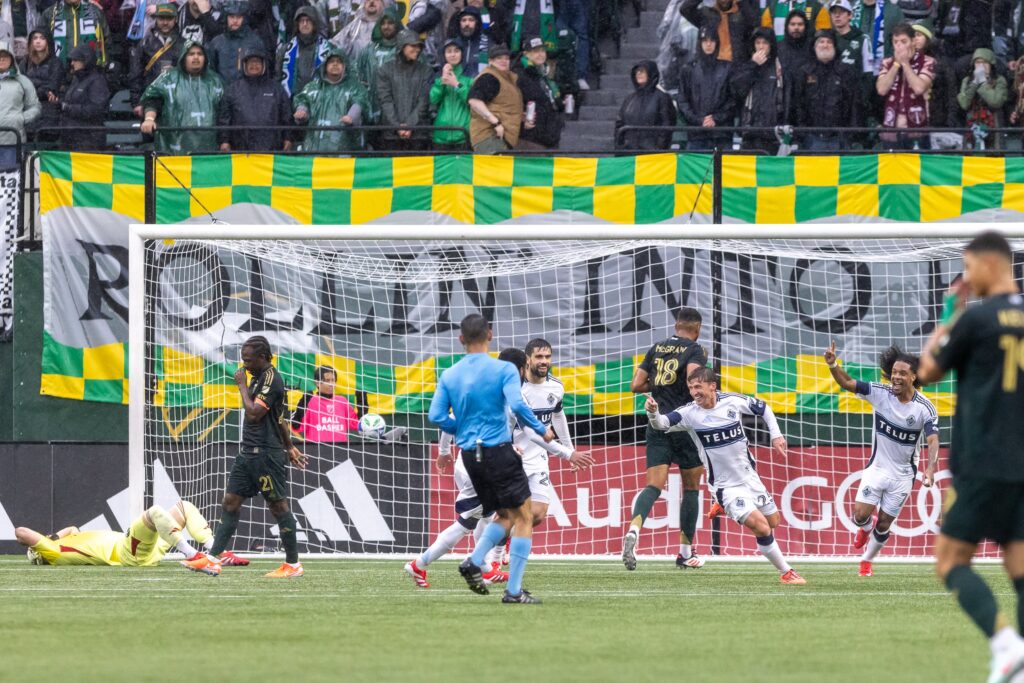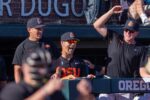Phil Neville could have pointed fingers.
He could have made a real stink. He could have squawked.
The Timbers coach could have deflected, denounced and condemned. He could have blamed.
But after a
season-opening loss to Vancouver
that looked a little too much like last year’s season-ending one, Neville did not do that. Certainly, no one would have faulted him if he did, which says more about our expectations of coaches than it does Neville.
“I don’t want to make excuses,” Neville said.
But it would have been completely understandable had Neville come out and declared that the 4-1 result was tainted by the performance of one Victor Rivas.
No, Rivas is not one of the new Timbers.
He was Sunday’s referee.
It was Rivas who reached quickly for a red card in the game’s 11th minute, questionably sending off defender Kamal Miller after a light tussle at the top of the box. And it was Rivas again who missed an apparent handball on Vancouver when the Timbers finally showed signs of life in the second half.
Instead of the shorthanded Timbers perhaps pulling within 2-1, it became an insurmountable 3-0 after the Whitecaps scored on the counter attack.
So you might have expected the fiery Neville to reach into his deep well of evocative English slang to criticize Rivas. Instead, he gave one of the best explanations for why he wouldn’t blame the ref that I’ve ever heard.
“We can sit here and hide behind the referee,” Neville said, “which probably in a season I will do. But that’s not for today. Because you know what? Even though I have real strong opinions of what I saw by the referee, we lost that game ourselves. Not the referee.”
Let’s break that down.
“We work really hard all season about being a really good defensive unit,” Neville said, “about being a compact shape, and one ball over the top cost us the game. And I say it cost us the game because … going down to 10 men cost us the game. That’s poor positioning, poor defending, not sticking to the game plan. That, to me, is all I’m thinking this moment in time is how can we improve that.”
I’ve heard plenty of coaches talk about controlling what you can control. About not blaming the officials because you always have another chance. But I don’t think I’ve ever heard it explained so simply and with such conviction.
Do you see what Neville did? Even though it was in fact the referee’s call that doomed the Timbers’ chances on Sunday, it was mistakes the defense made reacting to a deep pass that left Miller alone with Whitecaps forward Brian White and put Rivas in the position to make a call.
“Fundamentally, that piece of defending for that instant cost us the game,” Neville said. “That’s not on the referee.”
If I’m a Timbers fan, I love hearing that. It shows accountability in a way that blasting the guy with the whistle never will. Do I think that privately Neville is stewing over the way the game was called? No question. But he focused on a more productive conversation.
As a society, we have a complicated relationship with referees. We love them when they throw the flag, or pull a card, on the other team, but think they’re doltish failed athletes on a power trip when they do it to ours.
We see it all the time, to varying degrees of scale.
A hockey dad in Seattle is facing charges after he stormed onto the ice and shoved two children who were officiating his son’s game. That’s about as bad as it gets.
But I’ll cop to voicing my frustration at my son’s youth basketball game this weekend – despite reciting the parental oath that I would not do that very thing – when I felt the refs had let the game get out of control and become unsafe for the kids.
It’s always worth a temperature check when it comes to game officials.
Now, I would submit that Rivas had a particularly rough day at the office on Sunday. And this is not a teenager working for pocket change or a volunteer.
Rivas has been working games in Major League Soccer since 2018. In 2023 he was named the league’s top referee. So, he has earned the respect of his peers, players and coaches. And perhaps that was reflected in Neville’s restraint.
“We can say what we want about Victor,” Neville said, “we can be here all night talking about some of the decisions.”
Chief among those would be the handball no-call in the 53rd minute.
“Was it a handball or not? I think probably everybody in the stadium saw it,” Neville said.
Then he added the important part: “But it was still 80 yards from goal.”
Indeed it was. After the stadium erupted from the no-call Vancouver’s Jayden Nelson won a footrace to the other end and lasered a pass to Sam Adekugbe for the goal.
It killed the momentum that had come from new designated player David Da Costa’s entrance after halftime.
Portland was playing with 10 men, but that fact alone does not explain the constant breakdowns on the back line. That is an issue that has long dogged the Timbers — and by the way, raises certain questions about Neville as he enters year two at the helm with a very young team that is still dealing with a host of injuries.
Vancouver had 23 shots to the Timbers’ six.
Sunday was about moving forward after a dramatic offseason and the exit of star midfielder Evander. It would have been nice for the Timbers to start with a win, not a second straight blowout against a rival.
There is work to be done.
No excuses.
Not even if they’re sitting right there for the taking.
—
Bill Oram
is the sports columnist at The Oregonian/OregonLive.
Stories by
Bill Oram
-
Oregon State’s dominant regional comeback sets them up for more postseason success
-
Bill Oram: Booed for winning a state title, this Oregon teen now just wants a safe place to run
-
Bill Oram: The College Football Playoff’s course correction too little, too late for Oregon Ducks




More Stories
Bill Oram: Timbers coach Phil Neville had wise words about how we should think about referees when they err
Bill Oram: Timbers coach Phil Neville had wise words about how we should think about referees when they err
Bill Oram: Timbers coach Phil Neville had wise words about how we should think about referees when they err